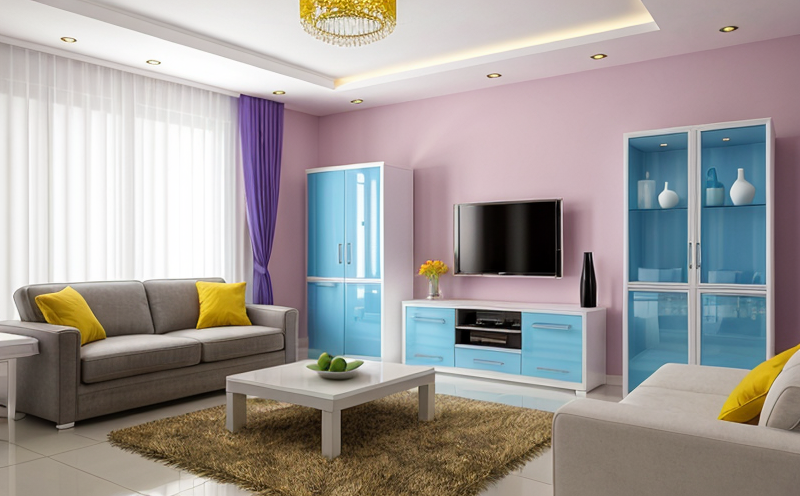JIS K 7191 Flexural Testing of Decorative Plastics
The JIS K 7191 flexural testing method is a critical procedure for assessing the mechanical properties of decorative plastics used in home decoration applications. This testing standard evaluates how well these materials can withstand bending stress without breaking or deforming excessively under specified conditions.
Decorative plastics are widely used in various household products such as furniture, flooring, and wall coverings due to their aesthetic appeal, durability, and cost-effectiveness. Ensuring that these materials meet the required mechanical performance is essential for product quality and safety. Flexural testing helps manufacturers identify potential weaknesses or areas where improvements can be made.
The test involves applying a constant bending moment to a specimen until it fails or reaches a predetermined deflection limit. The JIS K 7191 standard specifies clear guidelines on how to prepare the specimens, apply loads, and measure results accurately. This ensures consistency across different laboratories performing this type of testing.
For accurate results, it is important that the test samples are prepared according to the specified dimensions in the standard. Specimens must be cut from larger sheets or blocks of the material being tested to ensure they have uniform thicknesses and shapes. Proper curing conditions may also need to be followed during sample preparation to avoid any distortion affecting the test outcomes.
The testing equipment used for JIS K 7191 flexural tests typically includes universal testers capable of applying controlled bending loads with high precision. These machines often come equipped with software that allows operators to input parameters such as load rate, span length between supports, and maximum deflection or stress levels at failure.
Once the test is completed, detailed reports summarizing all relevant data points are generated by the testing equipment. Results include peak load, flexural strength (MPa), modulus of elasticity (GPa), and any other useful metrics derived from the experiment. Compliance with JIS K 7191 requirements ensures that decorative plastics meet industry expectations regarding their structural integrity.
Compliance with this standard is particularly important for companies involved in manufacturing or sourcing materials for home decoration projects. By ensuring compliance, businesses can demonstrate adherence to international quality standards and build trust among consumers who value product reliability above all else.
In summary, JIS K 7191 flexural testing plays a crucial role in evaluating the mechanical performance of decorative plastics used in home décor applications. It provides valuable insights into material behavior under bending stress which helps guide continuous improvement efforts aimed at enhancing both functionality and aesthetics.
Applied Standards
The JIS K 7191 flexural testing method is based on the principles outlined in the Japanese Industrial Standard (JIS) K 7191. This standard provides comprehensive instructions for conducting flexural tests on various types of plastic materials, including those used in home decoration applications.
- ISO 178:2019 – Plastics – Determination of Flexural Properties
- ASTM D790-18 – Standard Test Method for Flexure Properties of Unreinforced and Reinforced Plastics and Electrical Insulating Materials
- EN ISO 178:2015 – Plastics – Determination of Flexural Properties
The above standards share similarities with the JIS K 7191 in terms of methodology but may vary slightly depending on regional preferences. It is recommended that laboratories familiarize themselves with these international equivalents to ensure consistency when comparing results across different jurisdictions.
For decorative plastics specifically, additional standards such as ISO/TS 26305 may also be applicable based on specific product requirements or industry trends. These supplementary documents provide more detailed information about particular aspects of plastic performance that could be relevant in certain contexts.
Eurolab Advantages
At Eurolab, we pride ourselves on offering unparalleled expertise and precision when it comes to conducting JIS K 7191 flexural tests for decorative plastics. Our team of highly trained professionals ensures that every aspect of the testing process adheres strictly to the specified standards.
Our state-of-the-art facilities house some of the most advanced universal testers available today, allowing us to apply consistent and accurate bending loads to test samples. This guarantees reliable data collection throughout each experiment.
We take great care in preparing our specimens according to the exacting requirements set forth by JIS K 7191. Our dedicated personnel ensure that all materials are properly cured before being cut into standard dimensions, reducing variability and enhancing reproducibility.
Our comprehensive reporting services provide clients with detailed insights into their product's mechanical properties through clear visualizations of test results alongside raw numerical values. This helps decision-makers quickly identify areas where improvements can be made or confirm that existing designs meet all necessary criteria.
In addition to our technical capabilities, we prioritize customer satisfaction by offering flexible scheduling options and personalized consultation services throughout the testing process. Whether you need assistance with specimen preparation, instrument calibration, or interpretation of results, our team is here to support you every step of the way.
Environmental and Sustainability Contributions
The JIS K 7191 flexural testing method plays a significant role in promoting environmental sustainability by helping ensure that decorative plastics used in home decoration are both strong and reliable. By identifying any potential weaknesses early on during the product development cycle, this type of testing allows manufacturers to make informed decisions about material selection and design optimization.
- Reduces waste: Accurate flexural testing ensures that only high-quality materials are selected for production, minimizing the amount of defective or substandard products reaching the market.
- Promotes recycling: Understanding how decorative plastics behave under bending stress can aid in designing products that are easier to recycle at end-of-life, thereby extending their lifecycle and reducing landfill waste.
- Enhances energy efficiency: Strong yet lightweight decorative plastics contribute to more efficient building envelopes by providing better insulation properties while maintaining structural integrity.
By incorporating JIS K 7191 flexural testing into their quality assurance processes, companies can help drive positive change within the home decoration industry. This not only benefits consumers but also contributes positively towards global environmental goals related to resource conservation and waste reduction.





